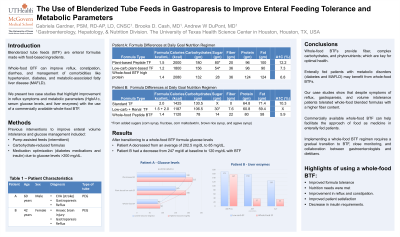Tuesday Poster Session
Category: Stomach
P5136 - The Use of Blenderized Tube Feeds in Gastroparesis to Improve Enteral Feeding Tolerance and Metabolic Parameters
Tuesday, October 29, 2024
10:30 AM - 4:00 PM ET
Location: Exhibit Hall E

Has Audio

Gabriela Gardner, RD
University of Texas Health, McGovern Medical School
Houston, TX
Presenting Author(s)
Award: Presidential Poster Award
Brooks D. Cash, MD, FACG1, Andrew Dupont, MD, MSPH1, Gabriela Gardner, RD2
1McGovern Medical School at UTHealth, Houston, TX; 2University of Texas Health, McGovern Medical School, Houston, TX
Introduction: Blenderized tube feeds (BTF) are enteral formulas made with food-based ingredients. BTF can be beneficial for patients exhibiting reflux, constipation, or diarrhea. The following two case studies highlight the outcomes in reflux symptoms and metabolic parameters (HgbA1c, serum glucose levels, and liver enzymes) of using a commercially available whole-food BTF. A whole-food BTF can improve tolerance to an enteral nutrition (EN) regimen in gastroparesis patients and improve the management of co-morbidities such as diabetes and metabolic-associated liver disease (MALD).
Case Description/Methods: Patient A is a 60-year-old male with a history of stroke. Patient B is a 42-year-old woman with anoxic brain injury. Both had a percutaneous endoscopic gastrostomy (PEG), were dependent on EN, had reflux, gastroparesis, and enteral volume intolerance. Glucose levels were >200s for both patients despite the use of pump-assisted feeds, carbohydrate-reduced formulas, and insulin regimens. After transitioning to a whole-food BTF formula, glucose levels for Patient A decreased from an average of 202.5 mg/dL to 85 mg/dL. Patient B had a decrease from 247 mg/dl at baseline to 120 mg/dL with BTF. HgbA1c improved from 10.3% while on a standard formula to 5.9% with the BTF formula and liver enzymes normalized for patient B. Both patients tolerated whole-food BTF, achieved goal EN feeding volume, reported resolution of reflux, and normal bowel function. Family members were also satisfied with the use of BTF and the decrease in insulin requirements.
Discussion: EN patients with gastroparesis who have metabolic syndrome, diabetes, or MALD would benefit from the fiber, complex carbohydrates, and phytonutrients present in whole foods. Commercially available BTF can help facilitate the approach of food as medicine in EN patients. These case studies show that whole-food BTF improved EN tolerance, metabolic parameters, and patient/caregiver satisfaction with the EN regimen. The implementation of a BTF regimen requires a gradual transition to BTF, close monitoring, and collaboration between gastroenterologists and dietitians.
Disclosures:
Brooks D. Cash, MD, FACG1, Andrew Dupont, MD, MSPH1, Gabriela Gardner, RD2. P5136 - The Use of Blenderized Tube Feeds in Gastroparesis to Improve Enteral Feeding Tolerance and Metabolic Parameters, ACG 2024 Annual Scientific Meeting Abstracts. Philadelphia, PA: American College of Gastroenterology.
Brooks D. Cash, MD, FACG1, Andrew Dupont, MD, MSPH1, Gabriela Gardner, RD2
1McGovern Medical School at UTHealth, Houston, TX; 2University of Texas Health, McGovern Medical School, Houston, TX
Introduction: Blenderized tube feeds (BTF) are enteral formulas made with food-based ingredients. BTF can be beneficial for patients exhibiting reflux, constipation, or diarrhea. The following two case studies highlight the outcomes in reflux symptoms and metabolic parameters (HgbA1c, serum glucose levels, and liver enzymes) of using a commercially available whole-food BTF. A whole-food BTF can improve tolerance to an enteral nutrition (EN) regimen in gastroparesis patients and improve the management of co-morbidities such as diabetes and metabolic-associated liver disease (MALD).
Case Description/Methods: Patient A is a 60-year-old male with a history of stroke. Patient B is a 42-year-old woman with anoxic brain injury. Both had a percutaneous endoscopic gastrostomy (PEG), were dependent on EN, had reflux, gastroparesis, and enteral volume intolerance. Glucose levels were >200s for both patients despite the use of pump-assisted feeds, carbohydrate-reduced formulas, and insulin regimens. After transitioning to a whole-food BTF formula, glucose levels for Patient A decreased from an average of 202.5 mg/dL to 85 mg/dL. Patient B had a decrease from 247 mg/dl at baseline to 120 mg/dL with BTF. HgbA1c improved from 10.3% while on a standard formula to 5.9% with the BTF formula and liver enzymes normalized for patient B. Both patients tolerated whole-food BTF, achieved goal EN feeding volume, reported resolution of reflux, and normal bowel function. Family members were also satisfied with the use of BTF and the decrease in insulin requirements.
Discussion: EN patients with gastroparesis who have metabolic syndrome, diabetes, or MALD would benefit from the fiber, complex carbohydrates, and phytonutrients present in whole foods. Commercially available BTF can help facilitate the approach of food as medicine in EN patients. These case studies show that whole-food BTF improved EN tolerance, metabolic parameters, and patient/caregiver satisfaction with the EN regimen. The implementation of a BTF regimen requires a gradual transition to BTF, close monitoring, and collaboration between gastroenterologists and dietitians.
Disclosures:
Brooks Cash: Abbvie – Consultant, Speakers Bureau. Alnylam – Speakers Bureau. Ardelyx – Consultant, Speakers Bureau. Astra Zeneca – Consultant, Speakers Bureau. Phathom – Consultant, Speakers Bureau. QOL – Speakers Bureau. Salix – Speakers Bureau. Vibrant Advisory Board – Advisory Committee/Board Member.
Andrew Dupont indicated no relevant financial relationships.
Gabriela Gardner: Functional Formularies – Consultant, Speakers Bureau. Takeda Pharmaceuticals – Speakers Bureau.
Brooks D. Cash, MD, FACG1, Andrew Dupont, MD, MSPH1, Gabriela Gardner, RD2. P5136 - The Use of Blenderized Tube Feeds in Gastroparesis to Improve Enteral Feeding Tolerance and Metabolic Parameters, ACG 2024 Annual Scientific Meeting Abstracts. Philadelphia, PA: American College of Gastroenterology.

